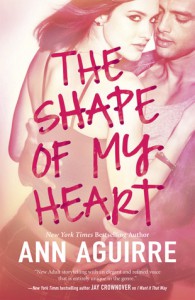Our Intrepid Heroine
Hello, new followers. Where did you come from? I have been really, really bad about reviewing books lately because I work too much, and I am mystified as to your arrival.
Thank you, though! I shall try to be more entertaining in the future.
 1
1
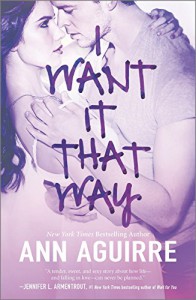
I started reading this book in line at Panera between work shifts, and the girl at the counter handed me my food and immediately asked what I was reading. Apparently, she's super into New Adult and made note of the title.
It's only my second New Adult title, and I'm liking it so far. If it's good, maybe I'll let her know next time I'm in. Either way, I seem to be a read-vangelist whether conscious of it or not!
 1
1

The Stranger is about a little desert community in the middle of post-apocalyptic maybe California, maybe Mexico, in which Norms and Changed try to defend their borders against potential hostile overthrow, mutated animals, and singing trees. When Ross Juarez, a prospector, stumbles into the town, they must decide whether to embrace him with open arms or view him as a potential threat. It's a fun, fast-paced story, part adventure story, part science fiction, and part community tale, and I will be so excited to read more of this world!
This is also the first book I have ever read in which homosexuality exists without homophobia.
It's also not about gay people being gay, there are just gay characters. While they are fully invested in having romantic relationships (just like the straight characters), everybody is most interested in surviving in a post-apocalyptic world with animals with magic powers and singing trees that will kill you. Which means they have their priorities correct.
Further, it's the single most diversely-written book I've read. There may be two or three white characters, but the book is populated predominantly with characters who are heavily implied to be of Hispanic descent. The native American, Japanese, and Chinese characters are highly informed by their culture and ethnicity, and citizens of the town are much less interested in each other's skin tone than their relative usefulness, political clout, or "changed" status, basically whether or not they have superpowers.
[spoiler]Also, I really hate YA "love triangles" and was desperately afraid there would be another one here. Instead, the two girls in question are already close friends, and they decide that if he'll go out with them, they both want to date the guy they like. They go to a dance as a threesome and are super supportive and kind to each other. I HAVE ALWAYS WANTED THIS TO HAPPEN IN A NOVEL. Such excite. I am seriously torn between hoping they stay a functional polyamorous triad for the rest of the series and hoping the girls decide that they want to pursue romantic feelings for one another, too. Because I have never seen a well-written actual love triangle, and I think having one in a sci-fi book would be super cool. Also, then there would be canon bisexuals in this story, which would be freaking fantastic.
[/spoiler]
 2
2
 1
1

This was not the book I expected to read on my honeymoon.
We drove up north the day after the wedding, still exhausted and reeling from the previous day. I wanted to leave as soon as possible, though, so that we could make the most of our week off. We arrived to a town full of sunshine, crisp air, and autumn colors, and I had planned a number of outdoor excursions to make the most of the fall season we hadn't had in Chicago.
The rain began at midnight, and as a thick fog unfurled over the town, I retrieved the book I had in the car. That was Maurice, which I had left in the backseat just in case I needed something to read before dragging my husband to the used bookstores nearby. I read it mostly between the hours of 1 and 4 on two separate insomnia-fueled, befogged, rain-drenched mornings, and this turned out to be the perfect atmosphere in which to read Maurice.
I did not expect to like Maurice as much as I did. This is the first work I've read by E. M. Forster, and it was mentioned on a book podcast I listen to regularly. It sounded interesting, so I picked up a copy at the library and then forgot it in my car.
The novel follows Maurice Hall through school and early adulthood in the Edwardian period. Maurice -- handsome, muddle-headed, and accustomed to following the lead of others -- struggles the entire novel with being "an undesirable of the Oscar Wilde sort." While at Cambridge, he meets Clive, a fellow undergraduate to whom he can pin his dreams, and so his life changes with the course of their relationship.
The novel was occasionally unpolished and I would definitely have liked to see some of the characters better developed. That said, I found this book fairly delightful. It was so nice to read a book from this time period with homosexual adult characters who didn't need to be constantly punished for their Sinful Love. It also got me thinking about the sexuality spectrum and functional vs. dysfunctional relationships, and I became unexpectedly invested in the love lives of assorted characters.
Spoilers from here on out.
I've read some criticism of the way that Clive was handled as a character: that he essentially has a fever one day and wakes up straight, and isn't that convenient. It is certainly true that Clive attributes his blessed state of matrimony partly to the fever. However, Clive also spends a majority of the novel deluding himself. And doing things like attempting to flirt with Maurice by giving him a copy of the Symposium, which is hilarious.
Clive and Maurice were not good for one another as a couple or as friends. Clive was too impressed with his social situation and obligations, and too deeply ashamed of any physical desire he had for Maurice to be the supportive partner that Maurice needed. And Maurice let Clive lead, including adopting many of Clive's mannerisms and philosophies which he did not always understand. Maurice did great things like be really, really contemptuous toward his family because Clive disdained his own. Maurice became an athiest because Clive argued him out of what little grasp of faith he had. He followed Clive around like a puppy begging for table scraps and trying to be satisfied with what little affection, respect, and social comprehension Clive could give him. And Clive began to feel cornered and smothered by Maurice's good intentions, lashing out at him and fretting himself into long-standing illness because the pretty, sometimes nice young man he fell in love with in college had turned into a less interesting version of himself who couldn't keep up with him.
Clive wanted someone who was quiet, sedate, and acceptable, and instead found himself with Maurice, who with all the best of intentions managed to be loud, slow, boistrous, and indescreet, in addition to being unable to appreciate the things Clive held dear. Like culture, travel, and academics. Maurice just wanted to go play rugby while the light was good. So when Clive suddenly began to notice women during a long illness (which could easily have been stress-induced), it startled and fascinated him, but he brought it up the same way he tried to voice an interest in Maurice in college: completely obliquely and in a way that went entirely over Maurice's head. Maurice just thought he was taking a ridiculous devil's advocate position and began to seriously worry that his boyfriend was dying because he was talking rubbish.
So when, wracked with the aftereffects of influenza, Clive dumped Maurice by trying to explain that he had begun to notice women, Maurice didn't believe him. He insisted that Clive was messing with him because that was the tenor of their relationship. And Clive was offended because Maurice didn't grasp that their relationship was doomed to be temporary the second Clive developed any interest in being involved with a woman.
There are examples throughout literature and film of the "evil" bisexual, but thankfully, this isn't one of them. Maurice certainly views Clive as a huge jerk who yanked him around and then parceled out affection piecemeal, and Forster was pretty much over it as well. Clive is certainly inconsiderate, and Maurice is at his worst when they are together. I read Clive as somewhere on the asexual scale (there is a line about how he never saw much use for sex anyway, as it is an inefficient use of time) but romantically interested in both genders. Given the time period, I can easily see him deciding that marrying a woman he's actually interested in being romantic with, in addition to being his duty as an upper class society man, could completely overrule his same-sex attraction. He may also have been burned out by relationships with men by dating Maurice, who didn't really like changes in his routine or read signals with any degree of success.
After their breakup, though still lonely and miserable, Maurice at least becomes a better person. A snob, surely, and reactive when people do not behave as he feels they should, but he is less casually cruel to others than he was while dating Clive. To become a better person, Maurice needed to be happy and to be with someone who let him be himself, and he was on his way to that toward the end of the novel. Less inconsiderate on a personal level, beginning to think for himself, willing to give up some measure of social status and financial gain in order to be happy with another person. Because I got a glimpse of that Maurice, I wanted for him to have a happy ending. And spending it with a hot bisexual working class guy sounds like a great way for Maurice to be happy.
 1
1

Had my workplace not strongly encouraged that I read this, I would not have gotten past Chapter 3.
This is a character-driven story (or should be -- more on that in a minute), and the best character sketch of the husband takes place on a passenger boat to Australia, where he is headed to sign up as a lighthouse keeper.
A soldier announces his plans to climb in some woman's cabin at night to steal her underwear while she's still wearing it. Tom does not report this to anyone, but for some reason can't sleep. He goes out on deck, where he gets a vague feeling that something's off, walks around for a bit, and finds the soldier, drunk, in the woman's cabin, leering at her and being generally sexually aggressive. What timing! It's almost like he was part of the conversation where the guy announced he was going to sexually assault a woman.
Instead of calling the authorities on the boat, Tom snaps at the guy, demands his name and rank, and tells him to get lost. Then tells the woman (still pressed up against the wall because there were two strange men in her cabin, one of whom tried to assault her) not to report the guy, because he's a veteran and "has had a bad enough time of it."
This. This is our hero. This guy? Really?
This is presented as reasonable advice. And a reasonable suggestion. Because Tom is so reasonable. And level-headed. Because you know what reasonable, level-headed people do? They agree to pretend that babies who washed up onshore are their own kids, because it would be unreasonable to upset their wives by saying no.
Reasonable doesn't even look like a word anymore.
But that's who these characters are. Prince Charming up here, a woman who has become unhinged because babies, a completely different woman (unhinged, babies), a grandmother who totally empathizes with unhinged, re: babies, a guy who is really rich and also concerned about his daughter (one of the unhinged: babies), and a baby.
I had no sympathy for the protagonists. They did something they knew was wrong, justified it to themselves, and seemed surprised that their actions had consequences. The author felt that they were the heroes and victims of this story and treated them kindly as a result. I have no such compunctions.
In addition to odd characterization, the setting was sort of amorphous. I got no feel for the setting -- none of the weather, no meaningful description of wildlife or people. The island was sort of developed, mainly by talking about its rather surprising lack of snakes and unapproachable nature, but it came off more as a literary device than an actual place. The author glossed over any real descriptions of the family's life on the island and panned over to other characters on the mainland (which also didn't feel like Australia, nor did it sound like it).
When a book tells me it is located at a specific location, situated during a specific period, I enjoy noticing some of the trappings of the time, maybe some linguistic differences. Instead, this book feels like the generic backdrop of a murder mystery set in London, not a small town in Australia. This is a big deal because the setting was supposed to strongly influence the characters' behavior.
Behavior which is irrational, self-justifying, and irritating. But really, I was done after that scene in the cabin. When the moral center of your book is okay with people committing crimes as long as they don't get caught, I am done. If the point was that he is a flawed hero, then the author still missed the heroic part.
 1
1
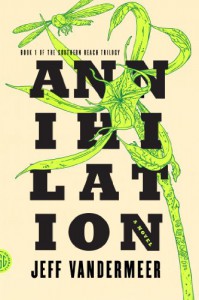
Annihilation was weird.
I have been turning it over in my head for a while, trying to figure out how to quantify its weirdness. Was it format? Was it the narrator? Was it a combination of things?
Annihilation is a story told in a field report written by an unnamed biologist who partway through the book admits that she is extremely bad about putting crucial information into field reports. This field report is about the 12th expedition to Area X, which is a wild patch in the middle of an undisclosed location which has proven, somehow, to be scientifically interesting in the vaguest of reported ways.
People who have returned from the previous expeditions have come back wrong. They suddenly show up at home, without clearing any checkpoints and seemingly under the noses of the expedition leaders, and some of them are irrevocably changed.
This is one of those stories in which a team of people goes into uncharted territory and everything goes terribly wrong almost immediately. The suspense-building passages are tightly written, although I got a little annoyed at the biologist for choosing not to talk about pertinent plot-related details at relevant points. She does this fairly frequently -- the biologist is a stubborn, self-contained person who does not want to share any information with anyone she does not trust, and she trusts no one. I finished the story still uncertain how well I knew the biologist and whether she was withholding information from the readers. This is the first in a trilogy, so I wouldn't be surprised.
As for the structure?
The expedition team was discouraged from using their names by "them" (their corporate sponsor?), so the characters are all referred to as their job titles. The biologist. The psychologist. The archaeologist. The surveyor. However, the narrator (the biologist) has internalized this suppression of names, referring to every person she speaks about by his or her job title or relation (my father, my teacher, someone I did not know) while simultaneously assigning honorifics to non-human organisms. She names a frog, different pieces of nature she encounters in Area X, identifies specific species of animals, but she does not see the purpose in identifying people by name.
The narrator struggles with language from the beginning, either not seeming to have the words to describe what she sees or possibly forgetting that her reader might not know what she was talking about, which can make it difficult to visualize her experience. Sometimes this was irritating, other times it worked well.
Once I sat down and read this, it moved fairly quickly. However, the low page count masks an occasionally dense book that is difficult to describe. The story would probably have been more straightforward if the narrator had had a different personality. However, she wouldn't have been nearly as interesting had she done what she was supposed to do in reporting the facts clearly. In exploring them as she saw them, the narrative swiveled every time circumstances or context required her to unclench her grip on information she seemed annoyed to have to share.
 2
2
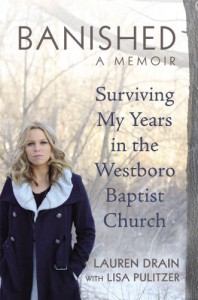
I picked this book up largely because I was hoping to learn why the WBC pickets military funerals, funerals of victims of violent tragedies, and other assorted events entirely unrelated to their core message of "god hates gay people."
I did not learn this. Instead, I learned that the WBC will picket any event, at any time, to spread "the word of god," which is apparently that God hates us all and wants us to die. I finished the book still unsure of why this is the case.
 3
3
A great problem to have
Four of my digital/streaming ARC requests were approved on the same day, right after two library e-books I'd been waiting for were returned. I have far too many books to read all at once, all of them with a timeframe attached.
I shall have to refuse to socialize for the next week. Such sacrifice. Much excitement. So reading.
 2
2
Does this happen to anyone else?
The Coldest Girl in Coldtown has sapped my reading mojo. I finished it on Monday, and I've been floundering around ever since, trying to get invested in other books. This, so far, hasn't happened.
It was really good, and it broke my brain for some reason, and now I want to read something just as good. Nothing so far has been forthcoming.
I blame the YA section, mostly. I read several addictive YA books in a row (These Broken Stars, Pegasus, The Demon's Lexicon, The Demon's Covenant -- I'm looking at you, Sarah Rees Brennan), and this is the book that did it.
I'm either going to have to do a complete genre switch or prowl the shelves at my local library, wailing that no book will ever complete my soul or some such nonsense. Then I'll be aware that I'm being melodramatic for no good reason.
 1
1
The Apartheid of Children's Literature
Of 3,200 children’s books published in 2013, just 93 were about black people, according to a study by the Cooperative Children’s Book Center at the University of Wisconsin.
There's a lot in this op-ed in the NYT that I want to quote, so you should probably go read it if you care at all about children's lit. Also check out the raw data from the study, as the Cooperative Children's Book Center documents much more than this single metric.
"We adults -- parents, authors, illustrators and publishers -- give [children] in each book a supposedly boundless imagination that can delineate the most ornate geographies, and yet too often today's books remain blind to the everyday reality of thousands of children. Children of color remain outside the boundaries of imagination. The cartography we create with this literature is flawed."
 3
3

This is less an adaptation than a straightforward updating of Sense and Sensibility. All characters have the same names, act in the same fashion (more or less), and follow a modernized version of almost the exact plot of the original.
Although I love adaptations and appreciate it when they are faithful to the source material, I was hoping for something slightly more inventive (perhaps a bit of additional character development? Elinor is an architect in this one. It would have been nice to hear more about it). Perhaps building on the established characters instead of simply reiterating the same.
On the bright side, the writing is engaging, and Ms. Trollope didn't have much more patience for Marianne's hystrionics than I did, so there was that.
 2
2

Basic premise: after her mother’s death, average-but-not-remotely-glamorous 18 year-old Becky Randle meets Tom Kelly (a thinly-veiled Calvin Klein), the most famous designer in the world. Tom makes her a one-time offer: he’ll design three dresses, which she will wear as the model for Tom Kelly the brand. In return, he will make her the most gorgeous woman who has ever lived.
Becky doesn’t quite believe him, but takes the leap anyway. To her shock, it works, and Rebecca Randle is an overnight sensation. And I can’t say much else without giving it all away.
Alternately hilarious, poignant, and unpredictable, I couldn’t put this book down. It’s a Cinderella story, one that includes some side commentary on beauty, class, fame, and design. Just when I thought I knew how this book was going to progress, the narrative suddenly veered in an entirely uncharted direction. Becky’s voice is well-defined, and she made me root for her the whole way through.
If you’re looking for something magical, here’s my recommendation.
 1
1
Will #readwomen2014 change our sexist reading habits?
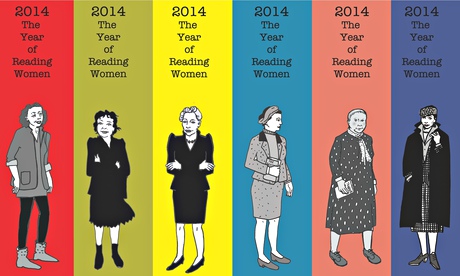
It's a truth universally acknowledged that, although women read more than men, and books by female authors are published in roughly the same numbers, they are more easily overlooked. Their marginalisation by top literary journals, both as reviewers and the reviewed, is confirmed in a yearly count by the organisation Vida: Women in Literary Arts. Perhaps the problem lies not with whether women are published, but how. Read more (via The Guardian)
Even if you don't agree, I think it's a great initiative and a way of discovering and experiencing new literary personalities.
Well, I doubt it will change overnight, but it would be nice to see more female authors without froofy covers!
 1
1







 4
4
